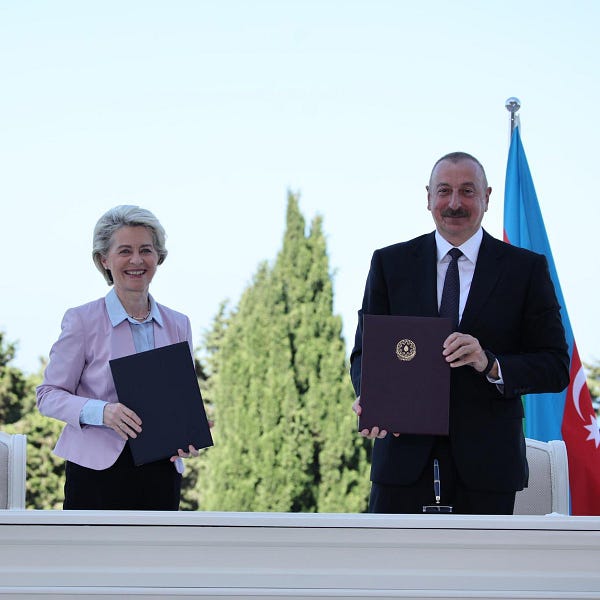Geopolitics of human rights is a bad idea
So bad, in so many ways. But let's start with Ursula von der Leyen's cringey love-fest with Azerbaijan
On July 18, Ursula von der Leyen, the Machtmensch who serves as President of the European Commission, visited Azerbaijan, for one of the most unedifying spectacles of her tenure:


She received harsh and well-deserved criticism from major human rights organizations and from livid MEPs (who’d only in March passed a resolution condemning Azerbaijan for the destruction of Armenian cultural heritage in Karabakh). Rightly so. It was made even cringier by von der Leyen’s tweeting one glowing photo of herself and Aliyev after another. It turned out that all this debasing in front of a dynastic autocrat was for (next to) nothing: no binding agreements were signed, Azerbaijan can’t even produce much additional gas and in any case, it would only go online in five years.
So far, so predictable.
Before I say anything else, I should point out that I belong to the Leave It In The Ground camp. Instead of desperately looking for more fossil fuels in unsavory places, we should leave gas and oil in the ground. Because of the looming climate catastrophe. Instead, we should cut emissions drastically, through all means available - investment in wind, solar, hydroelectric, heat pumps and promising new technologies, expansion of public transport, pricing the real cost of global warming into driving, flying and other energy consumption, subsidies for making buildings energy-efficient etc.
Personally, I don’t hold it against the EU that it does business with problematic governments. It is the way of the world. Millennia-old rules of diplomacy allow us to engage with iffy counterparts for mutual benefit while respecting sovereignty and not making things worse for everybody. The EU is such a big player in the world that it cannot help bumping into countries with less than stellar human rights records.
Also, having spent my entire working life on the democracy and human rights promotion circuit (its fringes, anyway), I have never seen any evidence that hectoring, punitive diplomacy makes countries on the receiving end more democratic, free and just.
The EU currently faces a serious energy crisis (albeit one of its own making). and it owes its citizens a concerted effort to overcome it. Since there is not enough gas produced by “nice” countries to cover the EU’s shortfall, it is both inevitable and reasonable for the Commission to approach not-so-nice countries like Azerbaijan.
But now that the Commission thinks of itself as a bold and virtuoso geopolitical player, they couldn’t just do this quietly and with humility. They had to fly von der Leyen to Baku, have her share the stage with a visibly gleeful Aliyev, shower him with undeserved praise, publish a flailing statement that calls Azerbaijan “reliable” a few too many times, throw in some self-congratulatory nonsense about how more gas from Azerbaijan will lead to the development of wind and hydrogen capacities and also connectivity and other good things (though not democracy, human rights or peace). And then do a Twitter storm about the whole depressing mess. Delusions of geopolitical grandeur made this much worse than it had to be.
Of course, I repeat, the EU could have done a lot more for decarbonization by now, so we could just Leave It In The Ground.
About the geopolitics of human rights. In 2020, the Commission published its Action Plan on Human Rights and Democracy 2020-2024, which included the ominous phrase “The time is therefore ripe for the EU to deliver a new geopolitical agenda on human rights and democracy.” At the time I found the hubris and shallowness of that line so off-putting I stopped reading. These days, I’m even more alarmed.
A geopolitical agenda on human rights is a contradiction in terms. If geopolitics is about shoring up one’s power and gaining more of it, at the detriment of competitors, and if need be, through means of force, where do human rights come in? Does it mean we choose our competitors on the basis of their unsatisfactory human rights record? All of them simultaneously? If yes, how does expanding our power at their expense, or containing them, improve the lot of their oppressed masses? Does it mean we choose our allies for their human rights record? What if our overwhelming geopolitical interests demand that we set aside human rights and democracy, as happened with the gas deal with Azerbaijan?
Or does it mean the EU, through its human rights grant-making in third countries, to local human rights defenders and their organizations, pursues its geopolitical interests? Do I have to spell out why this is bad idea?
It seems to me that the Commission and some member states got carried away by the heady notion of being a geopolitical player, one of the big boys of world affairs. But there is no mandate for it, not from the treaties, certainly no democratic mandate from the European public, and especially not for the Commission, which of all EU organs is farthest removed from democratic control and accountability. Never mind that the 27 member states have diverging interests in the world and can’t formulate a consensus geopolitical agenda between themselves. There is something very unmoored about this. Draping this half-baked geopolitical agenda in human rights doesn’t make geopolitics better. It probably makes human rights worse.
Also, Leave It In The Ground.


